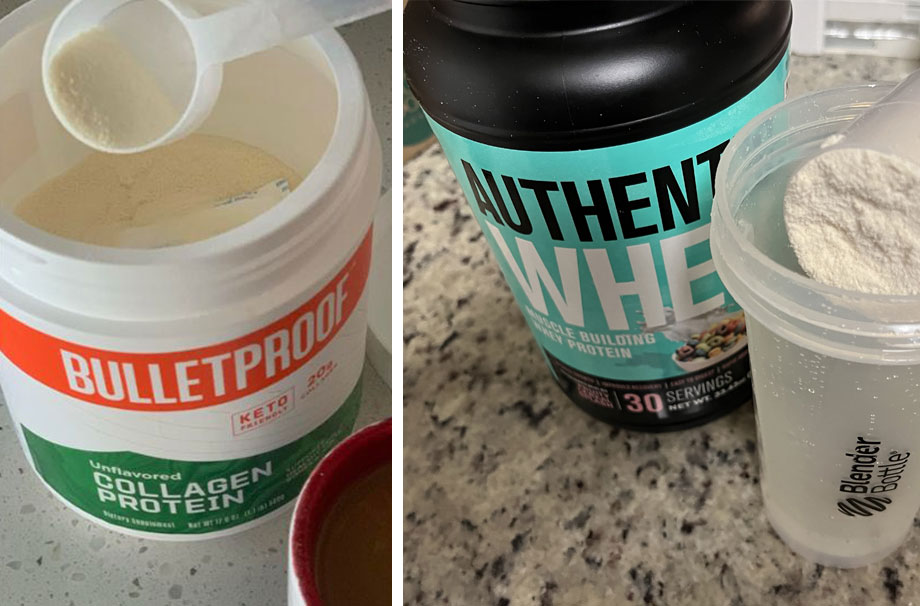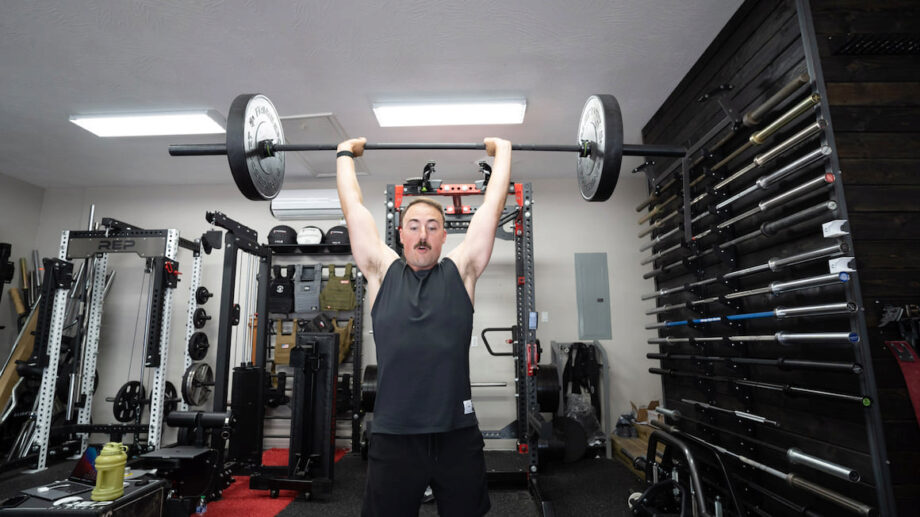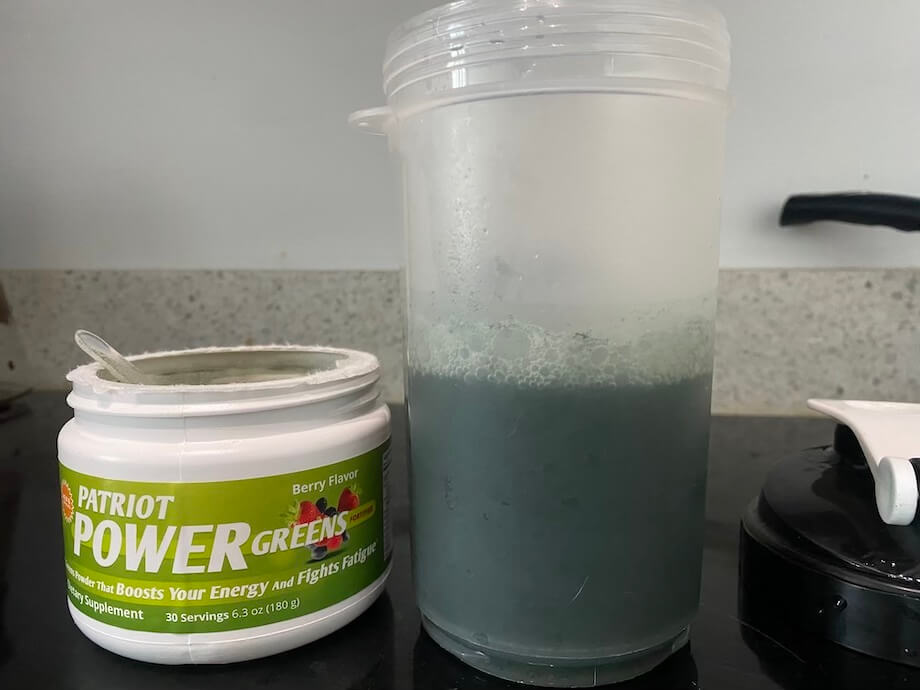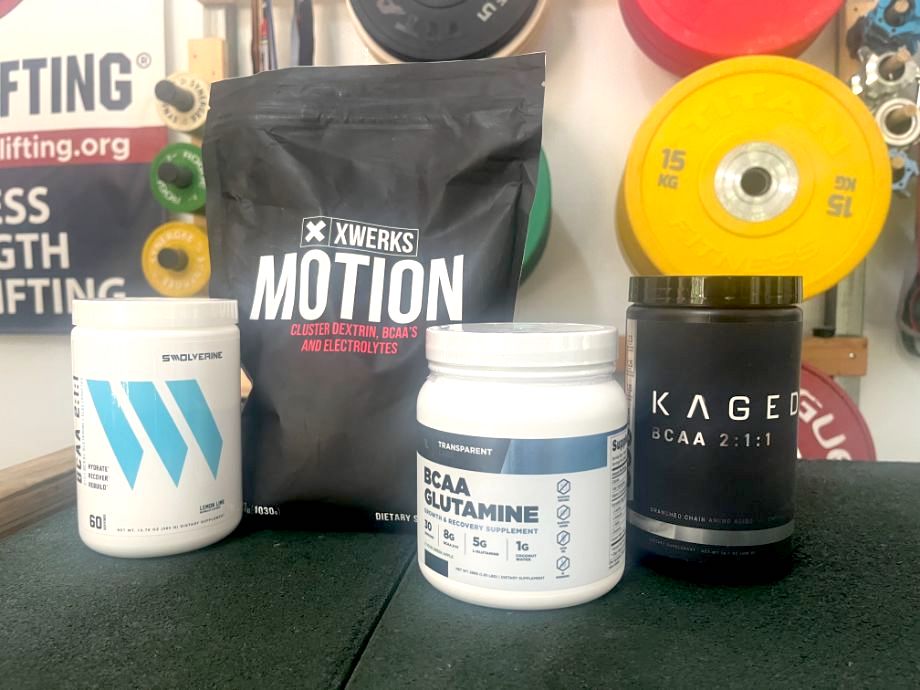Many years ago, I thought protein powder was just that—powdered protein. Now, with an education in nutrition and an interest in building muscle, I’ve found not all protein powders are the same. Supplement shops offer whey, casein, soy, pea, and collagen supplements, and if you don’t know the difference between them, this can cause some confusion. In this article, we’ll compare collagen protein vs whey protein to determine if either of these choices suits your health and wellness needs.
I’ll explore similarities, differences, benefits, and intended users of each product. As a registered dietitian nutritionist, I’ll also speak to the nutritional benefits of the different types of protein so you can understand just how it may impact your overall wellbeing and fitness.
Medical disclaimer: This article is intended for educational and informational purposes only. It is not intended as a substitute for medical advice. For health advice, contact a licensed healthcare provider.
What is Collagen Protein?
Collagen protein is the most abundant protein in the human body, creating structure for many bodily tissues, including ligaments, tendons, skin, and muscles. According to the Cleveland Clinic1, it makes up approximately 30% of the total protein in the body.
The body naturally makes collagen using amino acids, but as you age, collagen production declines. Therefore, incorporating a collagen supplement into your routine may provide advantages that keep you feeling and looking better. Collagen in supplements is mainly derived from cow or fish connective tissues, such as bones, skin, and cartilage.

Researchers2 have identified 29 different types of collagen that offer varying health benefits. Of those, only a few are commonly used in dietary supplements:
- Type I: Makes up 90% of the body’s total collagen1. Provides structure to skin, bones, tendons, and ligaments
- Type II: Provides joint support
- Type III: Found in connective tissues, bones, and skin
- Type IV: Found in layers of the skin
- Type V: Found in the corneas of the eyes, skin, and hair
Depending on the purpose of the supplement, these types are often combined to offer specific benefits of collagen protein powder. That said, collagen protein is popular for its ability to support bone, hair, nail, joint, and skin health. It may be of particular interest to individuals wanting to reduce wrinkles, improve skin elasticity, strengthen bone density, and decrease joint pain.
Collagen can’t be absorbed in its whole form and must be broken down into smaller peptides or amino acids, the building blocks of protein. Collagen protein powder is typically sold as collagen peptides or hydrolyzed collagen for easy digestion.
Unlike many other types of protein powders, collagen doesn’t contain all nine essential amino acids and, therefore, isn’t considered a complete protein. It’s lacking tryptophan, an amino acid the body must consume because it doesn’t synthesize it on its own. Because collagen isn’t a complete protein, it’s generally not used solely for the purpose of muscle building.
RELATED: Best Protein Powder for Muscle Gain
What is Whey Protein?
Whey protein is one of two protein families (the other being casein) found in dairy milk. Whey is a byproduct of cheese-making. Specifically, it’s the liquid part of milk separated during the cheese-making process. It undergoes processing to remove carbohydrates, fat, and water, leaving behind mostly protein. This protein concentrate is then dried into a powder.
Whey comprises several proteins that help support a healthy immune system3 and protect against disease, including beta-lactoglobulin, alpha-lactalbumin, bovine serum albumin, and immunoglobulins.
RELATED: What is Whey Protein?
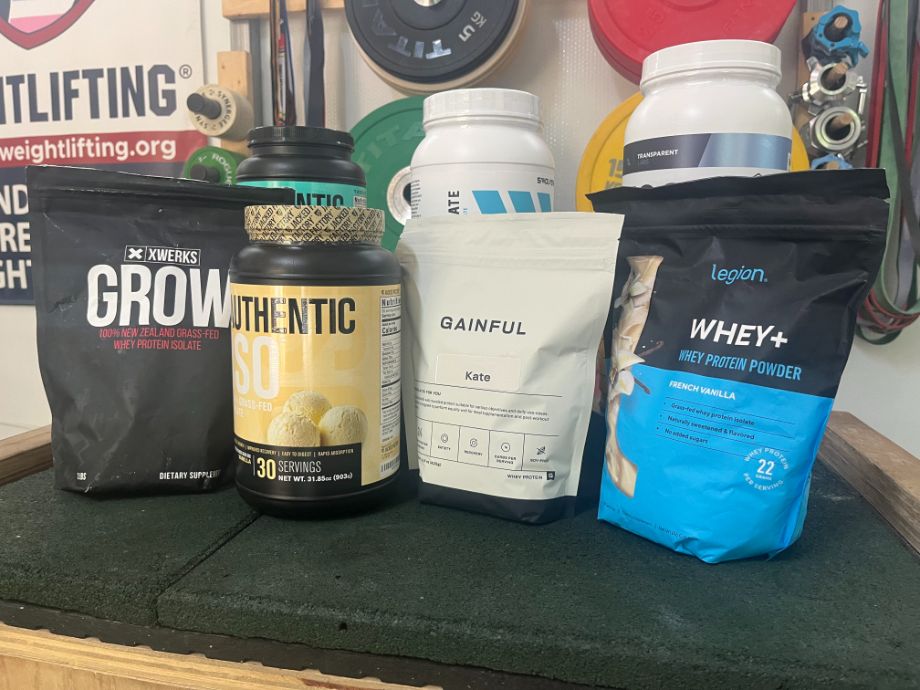
Recognized as a complete protein, whey contains all nine essential amino acids, including the three branched-chain amino acids (BCAAs). Notably, leucine, a BCAA found in higher concentrations in whey when compared to other protein powders, plays a crucial role in activating muscle protein synthesis4, which is needed for muscle growth.
Furthermore, whey is categorized as a “fast” protein because of its rapid absorption rate, meaning the amino acids in whey become available to the body and muscles very quickly after ingestion. Many bodybuilders take whey protein after a workout to give their muscles a quick supply of amino acids for optimal recovery and growth.
Side-By-Side Comparison
Here, we compare a 20-gram serving of collagen protein vs a 20-gram serving of whey protein.
| Collagen Protein | Whey Protein | |
| Calories | 71 kcal | 71 kcal |
| Protein | 17 grams | 16 grams |
| Carbs | 0 grams | 2-3 grams |
| Fat | 0 grams | <1 gram |
| Fiber | 0 grams | <1 gram |
| Iron | 0 milligrams | <1 milligram |
| Calcium | 41 milligrams | 79 milligrams |
Key Similarities Between Collagen and Whey Protein
There are three key similarities between collagen and whey protein.
Sources
Both whey and collagen protein powders are derived from bovine (collagen can be derived from fish, too). Whey is obtained from milk during the cheese-making process, while collagen is derived from connective tissues such as bones and skin. They are both animal proteins and are not suitable for strict vegan diets.
Convenience
Protein powder is versatile and easily integrated into daily routines, providing a quick and efficient way to increase protein intake. Whey and collagen protein can be conveniently incorporated into various protein shakes, smoothies, and recipes. For those in a rush, these supplements can be simply mixed with water or milk for a quick protein boost.
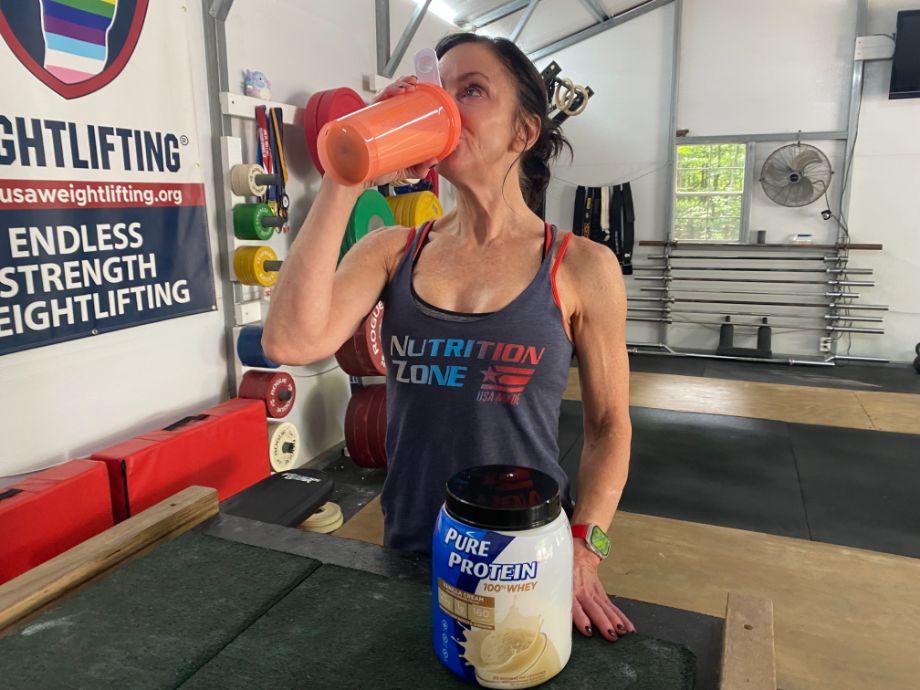
Bioavailability
Whey and collagen protein powders are known for their high bioavailability, meaning the body can efficiently absorb and utilize the amino acids they contain. Their amino acid profile differs drastically, so although they are both highly bioavailable, their amino acid profiles cater to different aspects of health.
Key Differences Between Collagen and Whey Protein
There are also three key differences between collagen and whey protein.
Amino Acid Profiles
Abundant in the amino acids glycine, proline, and hydroxyproline, collagen plays a crucial role in the structure and upkeep of resilient connective tissues, including skin, hair, nails, and bones. As mentioned previously, collagen protein is incomplete and does not contain the essential amino acid tryptophan.
Whey protein is a complete protein source that contains all the essential amino acids, which is ideal for muscle building. It contains higher concentrations of BCAAs, particularly leucine, which jumpstarts muscle protein synthesis.
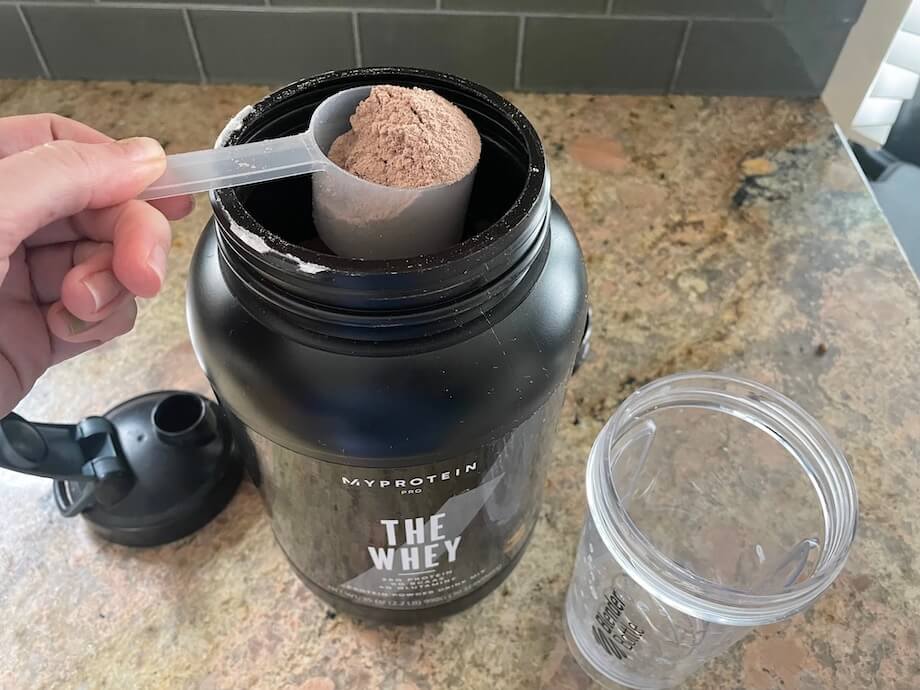
Purpose and Benefits
The amino acids in each whey and collagen protein serve different purposes in the body. Collagen protein may be beneficial for reducing wrinkles, strengthening skin elasticity, increasing bone density, and reducing joint pain. Whey protein may help build muscle mass and reduce body fat when taken in conjunction with a quality training program and balanced diet.
RELATED: Transparent Labs Collagen Hydrolysate Review
Digestibility
Individuals with lactose intolerance may experience gas, bloating, diarrhea, or stomach cramps when they consume whey protein. These individuals cannot properly break down the lactose in dairy products, including whey protein.
RELATED: Best Lactose-Free Protein Powder
Collagen is often sourced from cows but is not derived from cow’s milk. It doesn’t contain any lactose and is easily digested. When combined with liquid, it forms a gel-like consistency that may contribute to feelings of fullness and is generally well-tolerated, even by those with sensitive digestive systems.
Absorption Rate
Whey protein is widely viewed as a fast-digesting protein that’s ideal post-workout. According to a 2018 study published in the Journal of the International Society of Sports Nutrition5, the absorption rate is about 10 grams per hour. With many whey protein powders delivering around 20 to 25 grams per serving, it would take just over two hours for your body to fully absorb a typical dose. However, another study6 published in the same journal found that a patented blend of digestive enzymes increased the amino acid absorption rate by up to 127%.
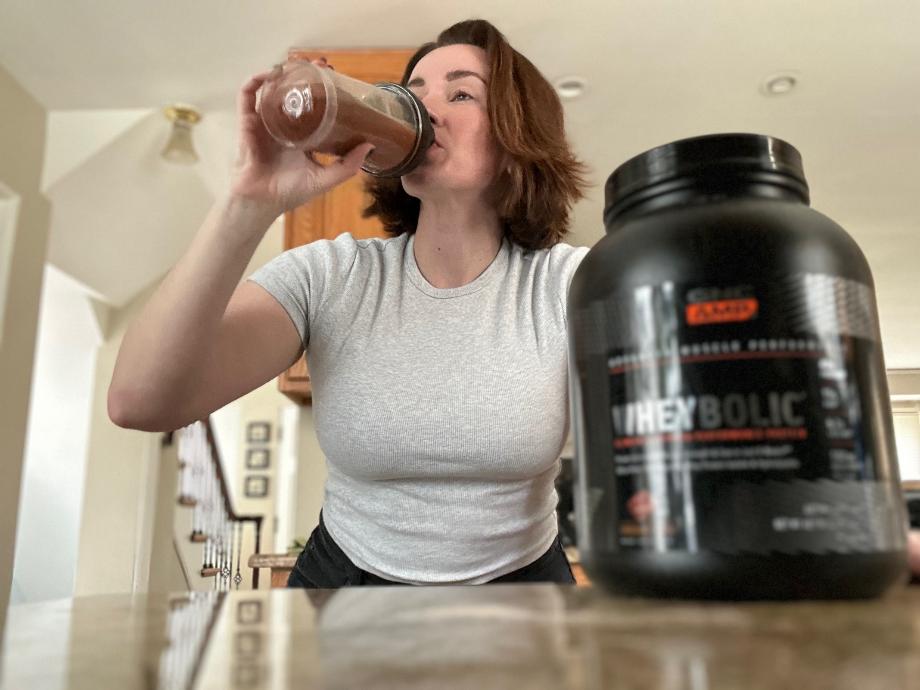
Meanwhile, hydrolyzed collagen has a speedier rate since it’s already broken down and “pre-digested” when it enters the body. According to a 2019 study7, enzymatically hydrolyzed collagen protein (EHC) had a higher absorption rate of the main amino acids (proline, hydroxyproline, and glycine) 20 minutes after ingestion.
Bone Density
While whey is king for building muscle, collagen takes the crown when it comes to bone density. The most abundant protein in your body plays a vital role in building and maintaining strong, healthy tissues—including bones and muscles. A 2021 study in the Journal of Bone Metabolism8 found that long-term supplementation with specific bioactive collagen peptides was effective in counteracting losses in bone mass density in subjects with osteoporosis or osteopenia.
Which Is Better For…
Here, we will look at which protein to use depending on your goals.
Building Muscle
For muscle building, opt for a high-quality whey protein powder. A diet high in protein supplemented with whey protein reduces muscle protein breakdown and may result in a positive net protein balance needed for muscle gains9.
RELATED: How Much Protein to Gain Muscle

What’s more, whey protein contains potent amounts of leucine, making it highly effective at promoting muscle protein synthesis. For this reason, it’s a top-notch post-workout supplement that supports muscle repair and the rebuilding process.
Weight Loss
Whey protein is the better option if you’re interested in weight loss. Consuming whey protein may result in fat loss because it increases lean muscle mass and the thermic effect of food (TEF).
The abundant leucine content of whey protein has been shown to build muscle while reducing body fat10. Muscle growth enhances metabolism, resulting in more daily calories burned because it takes more energy to build and maintain muscle than fat.
Lastly, whey protein draws out a greater TEF11 than other common types of protein powders, including casein and soy. This means whey protein requires more energy (calories) to be digested and absorbed, which could slightly increase metabolism, aiding in weight loss.
RELATED: Is Protein Powder Good for Weight Loss?
Recovery
Whey protein is considered more effective for recovery because it absorbs rapidly and stimulates muscle protein synthesis. Whey protein is a complete protein, containing all essential amino acids, and is particularly rich in BCAAs. BCAAs have been shown to reduce delayed-onset muscle soreness12 (DOMS) and enhance muscle recovery.
Bodybuilding
Will copious amounts of whey transform you into the next Chris Bumstead? Of course not. However, this form of protein is one of the keys to building a stage-worthy physique. Bodybuilders and many other athletes have downed whey protein shakes for decades because they’re an effective way (no pun intended) to support muscle growth and recovery.
That doesn’t mean bodybuilders don’t or shouldn’t take collagen. However, it would be a major challenge to sculpt a muscular body without supplementing with whey protein—especially if you don’t want to spend hours cooking and preparing meals.
Joint Health
Collagen is the clear winner when it comes to supporting healthy joints. A 24-week study13 conducted in 2008 on athletes with activity-related joint pain found that the use of collagen hydrolysate led to significant improvements in joint pain. This form of collagen contains biologically active peptides that are able to reach joint tissues and prevent cartilage from breaking down.
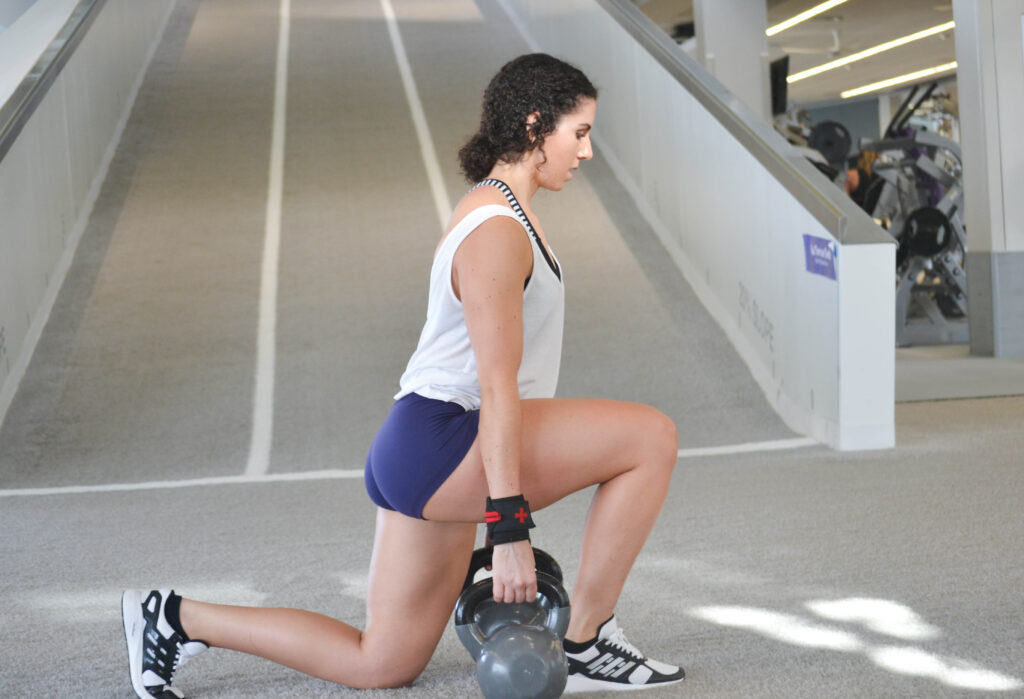
Skin Health
It’s no secret that collagen is one of the most popular skincare supplements. Many companies make collagen-based products to enhance your skin’s elasticity and hydration. This is especially important since your body produces less collagen as you age, which can contribute to issues like dry skin and the formation of wrinkles.
Whey Protein Benefits
Why should you make room for whey in your shaker cup? Besides being tasty (in most cases), there are many research-backed benefits of whey protein, including:
- It’s a complete source of protein, meaning it contains all nine essential amino acids.
- It supports muscle growth and repair.
- It has a positive effect on exercise performance.
- It may reduce hunger and cravings by triggering the release of hormones that signal satiety.
- It helps improve body mass index and waist circumference.
- It supports heart health.
- It supports healthier aging by helping people maintain or gain muscle mass.
Whey Protein Drawbacks
What do you need to watch out for if you’re considering making whey protein part of your diet? First, this is not an option if you’re sensitive to lactose or have a milk allergy. Even a single scoop can cause digestive issues such as bloating, gas, and diarrhea.
In addition, whey protein isn’t vegan-friendly, making it a no-go for people who follow this style of eating. Luckily, there are plenty of alternatives, including pea and hemp protein.
RELATED: Best Pea Protein Powder
Collagen Benefits
As the most abundant protein in the human body, collagen is absolutely essential for optimal health. From your hair to your skin to your joints, here’s an overview of the benefits of collagen protein powder:
- It supports skin health.
- It supports healthy joints.
- It may help maintain strong bones.
- It can help in building and maintaining muscle mass.
- It may help enhance your nail and hair health.
RELATED: SpoiledChild Collagen Review
Collagen Drawbacks
Luckily, there aren’t many drawbacks to taking collagen. At least, not in comparison to whey protein, which can cause digestive problems for those who don’t tolerate lactose well.
Some collagen supplements can cause minor side effects like bloating or an upset stomach. However, collagen is one of the safest supplements you can take, and many powders are unflavored so you don’t even have to worry about an off-putting taste.
Collagen and Protein Requirements As You Age
One of the downsides to aging is that your body’s collagen production process slows down. That makes supplementation particularly important, as it’s important to have a consistent supply of this vital protein to maintain healthy tissues. Plus, consuming collagen consistently may help counteract some of the signs of aging such as sagging skin and wrinkles.
Aging adults should also have whey protein on hand to help preserve lean muscle tissue. According to a 2015 study in the American Journal of Medicine14, muscle mass index is a strong predictor of longevity in older adults. These individuals should engage in strength training at least twice a week—along with consuming sufficient protein to support muscle recovery.
Who Should Use Collagen Protein?
Collagen protein is a good option for those who want to improve their skin, bone, and joint health. Collagen may specifically benefit the following individuals:
- Postmenopausal women with reduced bone density
- Individuals with symptoms of osteoarthritis, such as joint stiffness or pain
- Anyone wanting to improve skin elasticity and hydration
- Those interested in reducing the appearance of fine lines and wrinkles
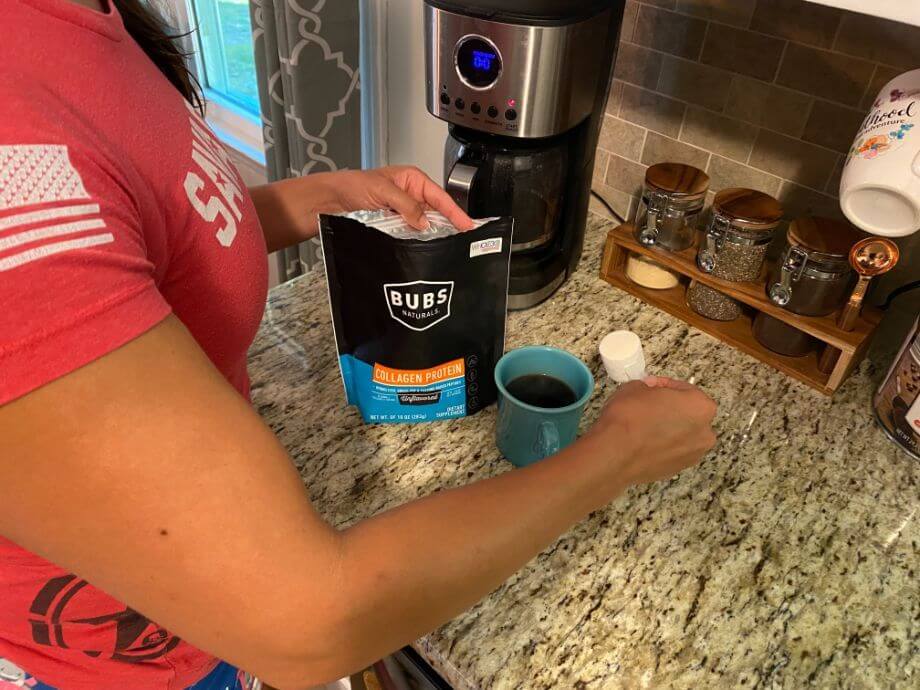
Who Should Use Whey Protein?
Whey protein is a great choice for those who engage in regular physical activity, including athletes and bodybuilders. Whey protein may appeal most to the following individuals:
- Those wanting support with post-workout muscle recovery
- Weight lifters who want to build lean muscle mass
- Individuals aiming to reduce body fat while gaining or preserving muscle
RELATED: The Science of Post-Workout Recovery
Collagen Protein vs Whey Protein: Final Thoughts
The choice between collagen vs whey protein powder comes down to individual health and fitness goals. Although they both contribute to overall protein and amino acid intake, their effects are very different. Collagen protein supports joint, skin, and bone health, while whey protein is particularly beneficial for muscle building and post-exercise recovery.
- Whey is a complete protein, and collagen is an incomplete protein
- Whey contains potent amounts of leucine, a BCAA that stimulates muscle protein synthesis
- Collagen is rich in glycine, proline, and hydroxyproline, amino acids that support skin, hair, nails, and bones
- Whey is best for muscle building, weight loss, and post-workout recovery
Collagen Protein vs Whey Protein: FAQs
Can collagen protein replace whey?
No, collagen protein can’t replace whey. Both types of protein contribute to overall protein intake, but the effects of collagen and whey are different. Whey is ideal for muscle building, recovery, and weight loss. Collagen is best suited for improving skin, bone, and joint health.
RELATED: How Much Protein Do I Need?
Can you build muscle with collagen protein?
Collagen protein powder may help you build muscle if combined with other protein sources. Collagen is an incomplete protein and lacks the essential amino acid tryptophan. All nine essential amino acids are required for muscle protein synthesis, which is needed to build muscle. Consider taking a complete protein, like the best whey protein, after a workout for muscle building.
Can I take whey and collagen together?
Yes, you can take whey and collagen protein together. However, it’s best to consume most of your protein intake from whole foods to ensure you’re getting a broad range of nutrients. Protein supplements should be used as a tool to reach your protein goals, not as a whole foods replacement.
RELATED: The Best High-Protein Foods to Add to Your Diet Now
Is it good to take collagen protein everyday?
Yes, it’s fine to take collagen protein daily to support skin, joint, nail, hair, and muscle health. A 2019 meta-analysis15 suggests a safe and effective dose ranges between 2.5 to 15 grams.
These statements have not been evaluated by the Food and Drug Administration. This product is not intended to diagnose, treat, cure, or prevent any diseases.
References
- Cleveland Clinic. Collagen.
- Shenoy M, Abdul NS, Qamar Z, Bahri BMA, Al Ghalayini KZK, Kakti A. Collagen Structure, Synthesis, and Its Applications: A Systematic Review. Cureus. 2022;14(5):e24856. Published 2022 May 9. doi:10.7759/cureus.24856
- Madureira AR, Pereira CI, Gomes AMP, Pintado ME, Xavier Malcata F. Bovine whey proteins – Overview on their main biological properties. Food Res Int. 2007 Dec;40(10):1197–211. doi: 10.1016/j.foodres.2007.07.005. Epub 2007 Aug 3. PMCID: PMC7126817.
- Kanda A, Nakayama K, Sanbongi C, Nagata M, Ikegami S, Itoh H. Effects of Whey, Caseinate, or Milk Protein Ingestion on Muscle Protein Synthesis after Exercise. Nutrients. 2016 Jun 3;8(6):339. doi: 10.3390/nu8060339. PMID: 27271661; PMCID: PMC4924180.
- Schoenfeld, B. J., & Aragon, A. A. (2018). How much protein can the body use in a single meal for muscle-building? Implications for daily protein distribution. Journal of the International Society of Sports Nutrition, 15(1). https://doi.org/10.1186/s12970-018-0215-1
- Oben, J., Kothari, S. C., & Anderson, M. L. (2008). An open label study to determine the effects of an oral proteolytic enzyme system on whey protein concentrate metabolism in healthy males. Journal of the International Society of Sports Nutrition, 5(1). https://doi.org/10.1186/1550-2783-5-10
- Skov, K., Oxfeldt, M., Thøgersen, R., Hansen, M., & Bertram, H. C. (2019). Enzymatic hydrolysis of a collagen hydrolysate enhances postprandial absorption Rate—A randomized controlled trial. Nutrients, 11(5), 1064. https://doi.org/10.3390/nu11051064
- Zdzieblik, D., Oesser, S., & König, D. (2021). Specific bioactive collagen peptides in osteopenia and osteoporosis: Long-Term observation in Postmenopausal women. Journal of Bone Metabolism, 28(3), 207–213. https://doi.org/10.11005/jbm.2021.28.3.207
- Tipton KD, Hamilton DL, Gallagher IJ. Assessing the Role of Muscle Protein Breakdown in Response to Nutrition and Exercise in Humans. Sports Med. 2018;48(Suppl 1):53-64. doi:10.1007/s40279-017-0845-5
- Jäger R, Kerksick CM, Campbell BI, et al. National Society of Sports Nutrition Position Stand: protein and exercise. J Int Soc Sports Nutr. 2017;14:20. doi:10.1186/s12970-017-0177-8
- Acheson KJ, Blondel-Lubrano A, Oguey-Araymon S, et al. Protein choices targeting thermogenesis and metabolism. Am J Clin Nutr. 2011;93(3):525-534. doi:10.3945/ajcn.110.005850 2009;107(3):987-992. doi:10.1152/japplphysiol.00076.2009
- Weber MG, Dias SS, de Angelis TR, et al. The use of BCAA to decrease delayed-onset muscle soreness after a single bout of exercise: a systematic review and meta-analysis. Amino Acids. 2021;53(11):1663-1678. doi:10.1007/s00726-021-03089-2
- Clark, K. L., Sebastianelli, W., Flechsenhar, K. R., Aukermann, D. F., Meza, F., Millard, R. L., Deitch, J. R., Sherbondy, P. S., & Albert, A. (2008). 24-Week study on the use of collagen hydrolysate as a dietary supplement in athletes with activity-related joint pain. Current Medical Research and Opinion, 24(5), 1485–1496. https://doi.org/10.1185/030079908×291967
- Srikanthan, P., & Karlamangla, A. S. (2014). Muscle mass index as a predictor of longevity in older adults. The American Journal of Medicine, 127(6), 547–553. https://doi.org/10.1016/j.amjmed.2014.02.007
- Paul, C., Leser, S., & Oesser, S. (2019). Significant amounts of functional collagen peptides can be incorporated in the diet while maintaining indispensable amino acid balance. Nutrients, 11(5), 1079. https://doi.org/10.3390/nu11051079




